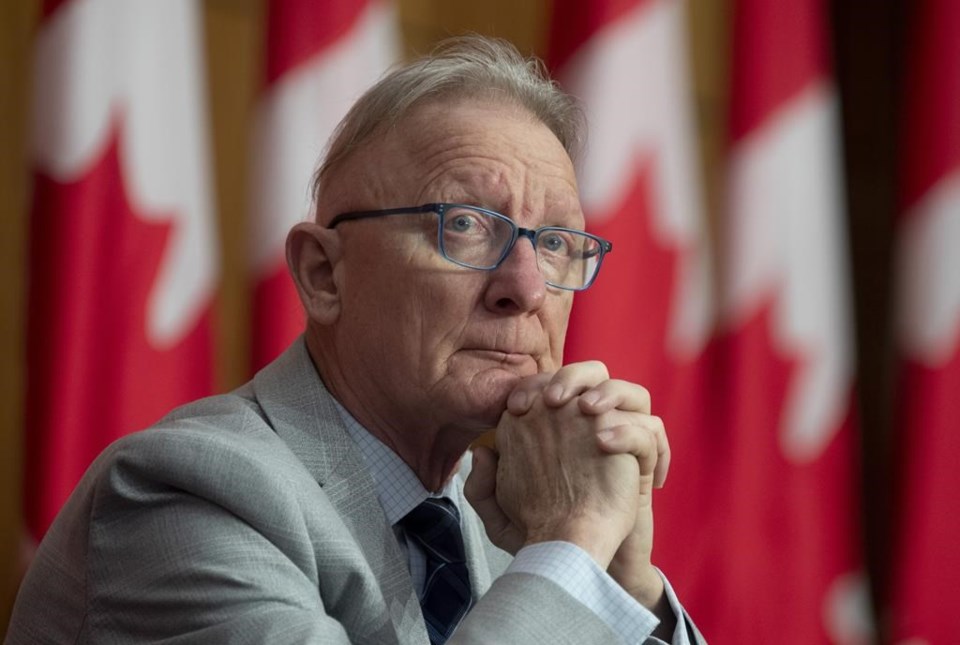OTTAWA — The federal Conservatives' top Quebec Tory says the party's concerns about the CBC do not apply to the broadcaster's French-language wing, but one of its senators suggests there is a need to look at it mandate.
Quebec Sen. Pierre-Hugues Boisvenu told reporters on his way into the party's weekly caucus meeting that Radio-Canada's mandate should be re-centred to its core mission.
"We've always said there was a form of competition that wasn’t healthy between the private sector and Radio-Canada since it is funded at a significant level," Boisvenu said in French on Wednesday, adding this was the party's policy even before the era of former prime minister Stephen Harper.
"The Conservative party has always said that we want to recentre the role of Radio-Canada in its core role, which is education, which is information, which is having a presence in the regions," he said, instead of competing with other broadcasters on content such as variety shows.
The Conservatives' position to cut the roughly $1 billion CBC receives in annual funding is wildly popular among its base, which is heavily concentrated in Western Canada.
Leader Pierre Poilievre has repeated the promise countless times to drum up support at rallies and in fundraising emails.
The long-standing pledge is garnering further attention after Poilievre recently asked Twitter to add the label of "government-funded media" to its main account. The social-media giant did so late Sunday.
But Poilievre's letter to the company requesting that change did not mention Radio-Canada, the broadcaster's French-language programming wing.
He has said in past media interviews that he sees value in offering services to francophone communities, particularly in regions where they are linguistic minorities, which would be areas outside of Quebec.
The corporation itself has clarified that funding only Radio-Canada and not CBC "would change the very nature of how programs and services are funded in Canada to target public money at only one language group."
Spokesman Leon Mar has said that it would require the federal Broadcasting Act to be "rewritten," as the law currently states the broadcaster must offer programming in both official languages.
Heritage Minister Pablo Rodriguez has also thrown water on the Tories' proposal, saying Tuesday that CBC and Radio-Canada are "the same institution."
Pierre Paul-Hus, Poilievre's lieutenant for the French-majority province, told reporters the same day that the next step is to see how to manage Radio-Canada's programming separately.
Paul-Hus, speaking in French, called Radio-Canada an essential service in Quebec as well as to francophones outside the province, saying CBC's English services are the main target of the party's criticism.
"It doesn't at all touch Radio-Canada. These are two different things," he said.
Boisvenu echoed some of Paul-Hus's comments Wednesday, saying that he believes that services to francophone communities outside Quebec are important and could be beefed up.
Poilievre's attacks of the CBC could have ramifications for the party's chances in Quebec, according to political analyst and former Tory leadership candidate Rudy Husny.
Husny said Radio-Canada enjoys a sizable audience in Quebec and Poilievre's attempts to draw a distinction between the French and English arms of the institution is a difficult message to land.
In 2008, Husny pointed out, the former Conservative government put some of the government's arts programming on the chopping block, which made Harper deeply unpopular in Quebec.
The more Poilievre pays attention to the CBC, the more he is "basically giving ammunition to the Liberals, the Bloc (Québécois) and the NDP to continue a narrative that, you know, the Conservatives are going to cut," Husny said.
"When it comes to Radio-Canada, French, culture, you all put it together — it strikes a chord."
Both the NDP and Bloc Québécois did not hesitate this week to charge that Poilievre is a threat to both French and culture.
Husny said that besides being an unpopular message in Quebec, Poilievre's decision to draw attention to his fight against CBC is poorly timed, since he remains a relatively new leader whose opponents are still trying to define him for future voters.
The Conservatives currently have nine seats in Quebec, far behind the governing Liberals and Bloc, which boast 34 and 32, respectively.
This report by The Canadian Press was first published April 19, 2023.
Stephanie Taylor, The Canadian Press



